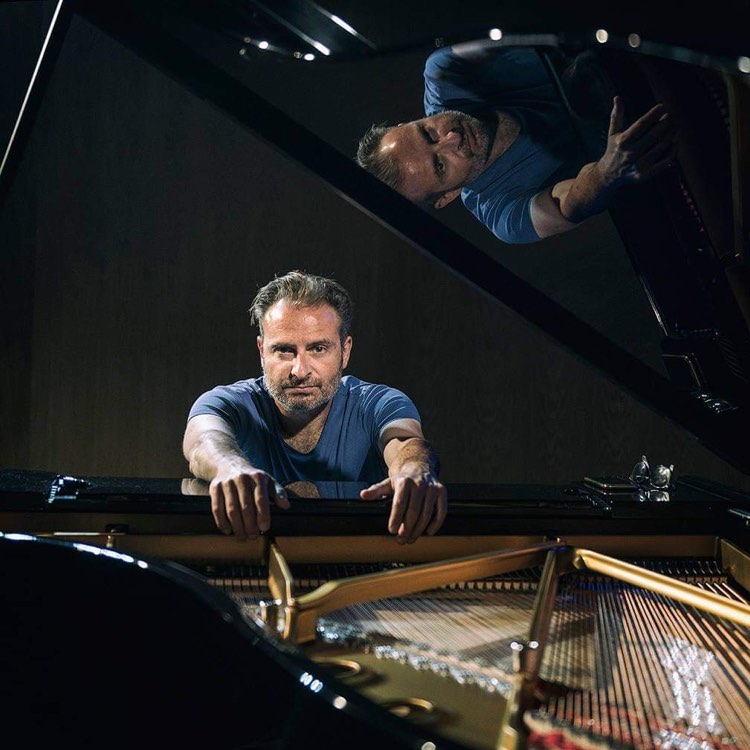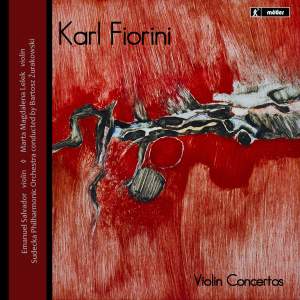
Karl Fiorini
Karl Fiorini (b. 1 December 1979) has been described as “a successor to such figures as Bartók and Shostakovich” (The Classical Reviewer) and “a composer with big ideas” (Ates Orga, The Classical Source). Fiorini’s prolific career started at the age of 10, and to date his opus totals more than 50 compositions, ranging from solo to chamber and large orchestral works. His repertoire includes two violin concertos, 4 piano concertos, a cantata and two symphonies as well as numerous works for orchestra both with and without voice.
Born in Malta, Karl Fiorini was encouraged from an early age towards a career in classical music. In his native country, he studied under composers Joseph Vella and the late Charles Camilleri, then with Diana Burrell at the Guildhall School of Music and Drama and Michael Zev Gordon at the Royal College of Music, London, where he obtained his Doctorate. Fiorini has received numerous bursaries and international prizes, including the Garfield Weston Foundation, London (2003) for the Piano Concerto No.2, twice the Janatha Stubbs Fund for young artists (2004 and 2008), and the Peter Moores Foundation, London (2006), which enabled him to further his studies. Other awards include Boston’s Alea III Composition Prize for his Trio Lamina for clarinet, violin and piano in 2004 and the Luxembourg Sinfonietta Prize for Composition in 2010 (third prize) for Nachtszenen for violin and chamber ensemble. He also won the 2005 Tracey Chadwell Memorial Prize for vocal composition with Aleamantes for soprano and piano. Fiorini has the honour of being the first Maltese composer to be invited for the prestigious Biennale di Venezia in 2015.
Fiorini’s early works were influenced by a Mediterranean identity, still prevalent in the music of his Maltese contemporaries. However, by the time he finished the Violin Concerto No.1 in 2007, he had completely detached himself from this movement, more so after he moved to France a year later. During this time Fiorini began to develop a rhythmic and harmonic language which is evident in his latest works, such as his two symphonies and de dioses y de perros (Of Gods and Dogs) for soprano, choir and orchestra (2015). Fiorini has written several pieces based on literature, setting texts in Maltese, French, German, English and Spanish languages. His most acclaimed work is Cadavre Exquis from 2012, which sets texts from three contemporary French, Spanish and Maltese poets, for three voices, orchestra and mixed media, commissioned by the Ensemble Télémaque, France as part of Marseille European Capital for Culture 2013. The European Contemporary Orchestra premiered this work at the Ballet National de Marseille, and later performed it in Mons and Flagey Theatre, Brussels, for Mons European Capital for Culture, 2015.
Fiorini’s creativity has been encouraged by commissions from the European Union Chamber Orchestra, UK, The Malta Philharmonic Orchestra, the Rotterdam Ensemble, Elixir Ensemble, France, Orcquestra do Norte, Portugal, Conservatoire de Musique et Danse d’Avignon, Conservatorio Superior de Granada, individual patrons, institutions, festivals and soloists.
Fiorini’s works are performed regularly and to date his music has been heard in most European cities, as well as in China, Japan, Thailand, Russia, Siberia, Ukraine and the USA in venues such as the Berlin Konzerthaus, Leipzig Gewandhaus, the Flagey Theatre, Brussels, Manoel Theatre, Malta, Kyoto City Hall, Japan, Cadogan Hall, London, Gulbenkian Centre, Lisbon and the Cathédrale St Louis des Invalides, Paris. In addition to his career as a composer Fiorini is the founder and artistic director of the International Spring Orchestra Festival, an annual classical music festival taking place in Malta during the month of April. His CD of violin concertos was released in 2014 by Divine Arts Records. Fiorini now lives and works in Paris.
Photo © Joe Smith 2021.
Text Claudia Gauci.
First performance: 29 June 2005, Guildhall School of Music and Drama, London, Janet Biasarowicz, soprano, Nigel Foster, piano.
Listen to a sample clip
First performance: Carina Albuquerque, cello, 17 September 2005, XII Biennale of Young Artists from Europe, Naples, Italy.
Suite for Young Pianists.
Prelude (3'); Nocturne (2'); Intermezzo No.1 (Elliot) (2'); Intermezzo No.2 (1'30"); Intermezzo No.3 (2'); Tango des Funambules (3').
Commissioned by the Conservatoire d'Avignon, France.
Listen to a sample clip
First performance: 14 May 2010, Gulbenkian Centre, Lisbon, Portugal, Emanuel Salvador, violin, Jill Lawson, piano.
Listen to a sample clip
First performance: Amacord Piano Duo - Ivana Alkovic and Maarten den Hengst.
Listen to a sample clip
Commissioned by EURText.
First performance: January 2014, Brno, Czech Republic.
Listen to a sample clip
First performance: 10 October 2011, Luxembourg, Luxembourg Sinfonietta, Jehanne Streppene, violin, Marcel Wengler, conductor.
Listen to a sample clip
First performance: January 2006, Guildhall School of Music and Drama, London, Emanuel Salvador, violin, Carina Albuquerque, cello, Aisa Ijiri, piano.
Listen to a sample clip
First performance: 5 April 2013, Teatru Manoel, Malta, Elixir Trio - Magalie Piccin, violin, Marine Gandon, viola, Michael Tafforeau, cello - Karine Selo, piano.
Listen to a sample clip
First performance: 25 September 2005, Boston, USA, Alea III Ensemble.
Listen to a sample clip
First performance: 25 June 2014, La Cathédrale St Louis des Invalides, Paris, France, La Musique Principale des Troupes de Marine, Brian Schembri, conductor.
Listen to a sample clip
Commissioned by the European Union Chamber Orchestra.
First performance: 6 November 2008, Hospital Real de Granada, Spain, EUCO, Gernot Süssmuth, conductor.
Listen to a sample clip
Commissioned by the European Union Chamber Orchestra.
First performance: 13 August 2017, Novomatic Forum, Vienna, Austria, Euro Sinfonietta Wien, Eldar Saparayev, conductor.
Listen to a sample clip
First performance: 14 January 2020, Manoel Theatre, Valletta, Malta, Malta Philharmonic Orchestra, Riccardo Bianchi, conductor.
First performance: 11 March 2018, Ukmerge, Lithuania, Latvian Chamber Orchestra, Brian Schembri, conductor.
First performance: March 2008, re:orchestra (Rotterdam), Roberto Beltrán Zavala, conductor.
Listen to a sample clip
Commissioned by Malta Enterprise.
First performance: 15 July 2015, Milan Expo 2015, Iltaly, Malta Philharmonic Orchestra, Brian Schembri, conductor.
Listen to a sample clip
Duration 12'.
First performance: March 2010, re:orchestra (Rotterdam), Charlene Farrugia, piano, Roberto Beltrán Zavala, conductor.
Listen to a sample clip
First performance: 13 March 2008, re:orchestra (Rotterdam), Emanuel Salvador, violin, Roberto Beltrán Zavala, conductor.
Listen to a sample clip
First performance: 16 May 2012, Bangkok, Thailand, Thailand Philharmonic Orchestra, Marta Magdalena Lelek, violin, Gudni Emilsson, conductor.
Listen to a sample clip
First performance: 14 April 2018, Teatru Manoel, Valletta, Malta, Tyresias Ensemble (UK) and Neopolis Virtuosi (Poland), Dimitri Scarlato, conductor.
Text Ana Bocanegra Briasco, Emmanuelle Favier and Claudia Gauci.
Commissioned by the Ensemble Télémaque.
First performance: 15 June 2012, Ballet National de Marseille, European Contemporary Orchestra, Raphaëlle Kennedy, soprano, Raoul Lay, conductor.
Listen to a sample clip
Text Rudyard Kipling.
First performance: 9 May 2017, Mediterranean Conference Centre, Malta, Malta Philharmonic Orchestra, Nico Darmanin, tenor, Brian Schembri, conductor.
Listen to a sample clip
Text Goethe.
Commissioned by Dr John Vassallo.
First performance: 15 July 2011, Kurhaus, Wiesbaden, Germany, re:orchestra (Rotterdam), Karen Motseri, soprano, Roberto Beltrán Zavala, conductor.
Listen to a sample clip
Text Ana Bocanegra Briasco.
First performance: April 2016, Mediterranean Conference Centre, Malta, International Spring Orchestra Festival, Malta Philharmonic Orchestra, The New Choral Singers, Claire Debono, soprano, Brian Schembri, conductor.
Listen to a sample clip
Text Sophie Charpentier.
Commissioned by the Valletta Cultural Agency.
Text Manwel Dimech.
First performance: 5 October 2013, Malta Philharmonic Orchestra.
 Violin Concerto No.1*; Violin Concerto No.2**
Violin Concerto No.1*; Violin Concerto No.2**
Metier MSV28533.
Listen to a sample clip
 Trio Lamina; Two Piano Etudes; Piano Trio; Piano Sonata; In the midst of things
Trio Lamina; Two Piano Etudes; Piano Trio; Piano Sonata; In the midst of things
HNH International GP880.

